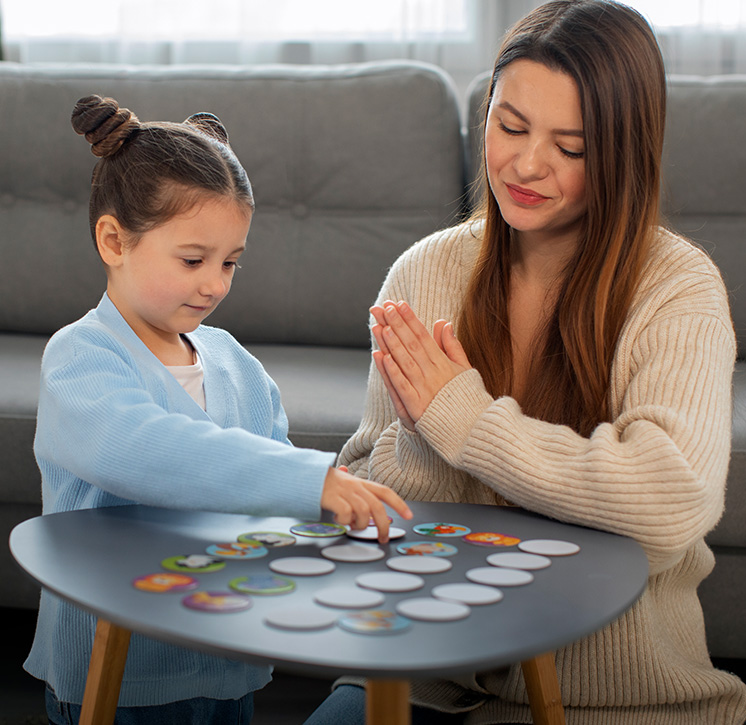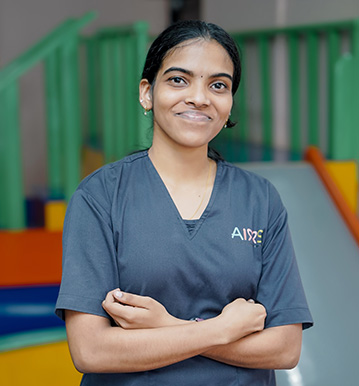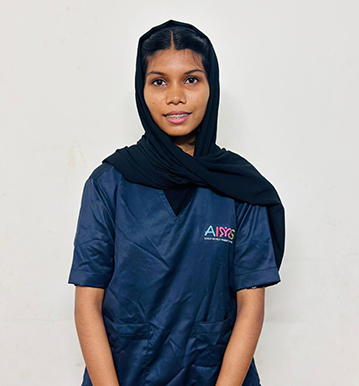Special Education for Children
-
AIMS > Special Education for Children

Education of Children With Special Needs
Special education is intended to educate students in a way that addresses their specific needs. Its purpose is to build upon and enhance a student’s strengths, while also identifying their weaknesses—for example, in mathematics—and providing support for that specific weakness to help them succeed in those areas.
What is Special Education?
Special education is a type of teaching designed for children who learn differently or face challenges in school. It doesn’t mean something is “wrong” with your child—it simply means they may need extra support to learn in the way that works best for them.
Some learning needs are easy to see, while others are harder to recognize. For example, a child may be full of energy, struggle with reading, or find it difficult to focus in class. Over time, these challenges can affect their confidence and love for learning. That’s where special education can help.
In most cases, children receiving special education stay in regular classrooms but get extra support—like more time on tests, one-on-one help, or special learning tools. In other cases, they may spend part of their day in a smaller group with a specialized teacher. A few schools, often private ones, are designed specifically for children with certain needs, like autism or dyslexia.
what kind of support they will get at school. Parents, teachers, and specialists work together to make this plan and adjust it as the child grows. Aims believe every child deserves the chance to thrive. With the right guidance, tools, and care, children with special needs can succeed in school—and in life.
Who Needs Special Education?
Children may need special education if they face challenges with learning, communication, or behavior that make it harder to succeed in a regular classroom. Teachers and parents can support them better with the right strategies, such as:
- Pre-teach vocabulary – Help students understand new lessons by introducing key words early.
- Repetition and practice – Go over skills often, and keep routines consistent.
- Set realistic goals – Avoid goals that are too high or too low; aim for steady progress.
- Use visual aids – Charts, graphs, and models make lessons easier to follow.
- Incorporate interests – Link lessons to topics your child enjoys.
- Checklists for tasks – Use step-by-step lists for homework, classwork, and activities.
- Behavior support plans – A Behavior Intervention Plan (BIP) helps manage challenges.
- Instructional scaffolding – Provide support until the child can do tasks independently.
- Build strong relationships – A caring teacher-student bond encourages success.
- Graphic organizers – Help connect ideas and see the “big picture.”
- Frequent assessments – Check progress regularly to adjust teaching methods.
- Alternate assignments – Give different types of tasks to match learning styles.
- Organized worksheets – Keep work neat and easy to understand.
- Outlining strategies – Break lessons into main ideas and details.
- Limit lesson load – Focus on fewer concepts at a time to avoid overwhelm
- Show model work – Provide examples so children know what “good work” looks like.
Benefits of Special Education
- Personalized Learning – Every child learns differently. Special education creates a plan that fits your child’s unique needs instead of a “one-size-fits-all” method.
- Focus on Individual Strengths & Challenges – Children with autism, ADHD, or other learning needs can work on their specific challenges without the pressure of keeping up with peers.
- Boosts Self-Confidence – In a supportive environment, kids feel understood and encouraged. This helps reduce frustration, anxiety, and low self-esteem.
- Better Academic Progress – With the right support, children often improve in key subjects like reading, math, and language skills.
- Long-Term Success – By learning how to cope with challenges and build independence, children are better prepared for higher education, jobs, and everyday life.
- Inclusive Classrooms – Learning with peers of different abilities helps improve social skills, teamwork, and a sense of belonging.
- Emotional Growth – Kids feel less “alone” when they interact with peers who face similar challenges, which builds confidence and emotional strength.
- Strong Parent–Teacher Teamwork – Special education encourages collaboration between parents, teachers, and therapists to create the best plan (IEP) for each child.
- Supportive & Safe Environment – Children feel accepted and motivated, making school a place they enjoy rather than fear.
Our Approach
At our center, we believe every child learns in their own unique way. That’s why we use flexible methods like unit studies and hands-on activities that make learning easier and more enjoyable. Instead of forcing a “one-size-fits-all” curriculum, we adapt lessons to your child’s strengths and interests.
For children, especially those on the autism spectrum or with learning differences, transitions between subjects can feel overwhelming. With unit studies, all subjects are connected under one theme, so children don’t feel like they are constantly “switching gears.” This helps them stay focused, confident, and happy while learning.
Our approach also encourages parents to relax—because not every activity works for every child. We help you choose what truly benefits your child, whether it’s interactive learning, problem-solving tasks, or memory-based activities. This reduces stress for families and makes learning a positive experience for everyone.
Services
AIMS provides comprehensive therapeutic and educational support through a multidisciplinary approach, promoting independent living and overall development for individuals with diverse needs and challenges.
Guided by Expert Special Educators
Your child will be supported by our highly qualified and caring special educators:


Why Choose Us
Years of Service
Children Supported
Expert Professionals
Sessions Conducted

EXCELLENTTrustindex verifies that the original source of the review is Google. Good therapy centre for your child .They have a lot of therapy there. There is a very friendly therapist there. Sending my child there was the best decision I made in my life.Trustindex verifies that the original source of the review is Google. I am incredibly grateful to AIMS Child Development Center for the positive impact they have had on my child's development. My child attended both Behavior Therapy and Speech Therapy sessions, and I am truly pleased with the progress made in such a short time. From the very first session, the team at AIMS demonstrated professionalism, warmth, and a deep understanding of child development needs. The therapists were patient, friendly, and consistently engaged my child in ways that made learning fun and effective. In Behavior Therapy, we saw significant improvements in how our child managed emotions, followed routines, and responded to instructions. There has been a clear boost in social interaction and self-regulation, which has made daily life much smoother for both our child and our family. In Speech Therapy, we noticed remarkable growth in communication skills. Our child began using more words, improved pronunciation, and showed greater confidence in expressing thoughts and needs. The structured and consistent approach of the speech therapist played a major role in this progress. Overall, the team’s dedication, personalized care, and positive environment contributed greatly to my child’s development. I highly recommend AIMS Child Development Center to any parent seeking professional and compassionate support for their child’s growth. Thank you for making such a meaningful difference in our livesTrustindex verifies that the original source of the review is Google. "Effective and compassionate support for behavioral challenges. Individualised teaching help very much to improvement in reading and writing skills .Trustindex verifies that the original source of the review is Google. Excellent Rehabilitation Centre in Pattambi, Kerala. We are from abroad. We are staying in Pattambi only for the therapies . Though Child doesn't know local language. Smitha Mam and Mushtaq Sir understand all our difficulties giving therapy in English only. And both of them are very friendly approached with any questions and concerns . And all the therapists are well talented, well educated and very good approached to childrens. Very good improvement i could see. I can strongly recommend to others to come and get the therapies from AIMS Pattambi.Trustindex verifies that the original source of the review is Google. AIMS Child Development Center in Pattambi offers excellent behavior therapy and speech therapy services. Their expert team provides personalized interventions to support children's communication, social skills, and emotional well-being. With a child-friendly environment and evidence-based techniques, they help children reach their full potential.Trustindex verifies that the original source of the review is Google. AIMS Child Development Center, is a well-equipped facility dedicated to children with special needs. It offers speech, occupational, physiotherapy, and behavioral therapy, tailored to each child. The experienced and compassionate staff create a child-friendly, engaging, and effective therapy environment.Trustindex verifies that the original source of the review is Google. Behavior therapy and speech therapy was very useful for my child very good service
Get in Touch with Us
Unlock Your Child’s Potential with Individualized Special Education—Reach Out Now
Faqs
How are physical activities are beneficial for children special education ?
Physical activities are highly recommended in children’s special education because it can help reduce the level of depression, anxiety, and stress, improve social interactions, better emotional and psychological health, and cognitive benefits.
How science and technology helping special children in education ?
Science and technology can help special children in education by using various tools and technologies like, text-to-speech tools, interactive technologies like games and simulations.
How to manage children with special needs in inclusive education ?
Managing children with special needs can be done with a multifaceted approach depending on needs of special children, creating a supportive environment, and following effective teaching strategies.
What do u mean by special education to children ?
Special education is a kind of service that can be provided in different ways. Special education focuses on differently abled children and children with learning issues.
Why do exceptional children need special education
Children who need special education means that they are differently abled or have any learning issues. If they don’t get proper special education it will be more difficult to them.


